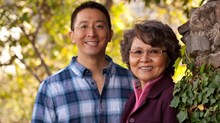Slowly, but Together
It was the day of the marathon. My running buddies and I had signed up to raise funds for World Vision to help provide clean drinking water to children and families in Africa. I was set to run alongside 38,000 other runners. I remember the smiles on our faces as my friends and I officially crossed the starting line about 30 minutes after the race had started. The first nine miles flew by and I was feeling good.
But it was hot that day. The race organizers put out an emergency alert from green to yellow and then red, meaning high risk conditions for dehydration. My legs started to cramp around the 10-mile mark, and by the 12-mile mark I'd decided I wasn't going to make it. My running partner, Anne, was sticking to the code, "No one runs alone," and wasn't about to leave me behind. Between 10 and 12 miles she ran up to our pace group then circled back to me about a block or two behind, and back and forth she'd go. At one point I told her to stay with the others or she'd wind up running a 30-mile marathon. She wouldn't listen.
I decided I needed to quit before she fell so far back she couldn't catch the rest of our pace group. I knew I wasn't going to make it another 14 miles in the condition I was in.
At the 12-mile mark I found my husband, Matt, standing on the curb taking photos. When I saw him, I told Anne to please go ahead without me. I was quitting. My legs were aching terribly. I stumbled over to him and broke down in his arms.
"I can't finish," I cried. "The cramps in my legs are too bad."
"Okay," he said. "That's fine." But then he added, "Why don't we just walk to the half-marathon mark? It's only a mile down the street. I'll walk with you."
I looked into his face. He was going to walk it with me.
"Okay," I said. I can do one more mile, I thought. Just take it easy, walk, and have Matt next to me.
My legs were still cramping, but as I walked and drank more Gatorade, they started to loosen up.
When we arrived at the 13.1 mark—the halfway point—Matt said, "What do you think will be harder to recover from: leg cramps or the disappointment of not finishing something you set out to do?"
He was right. The leg cramps would be gone in a few hours, while the pain and disappointment of not finishing the marathon would last probably forever.
"Let's go," he said. "We can do this. Let's just keep walking. You weren't planning to win anything today anyway, right? What's the difference if we finish in six hours or seven hours?"
I agreed and took a good look at my husband. He was carrying a five-pound Nikon camera around his neck, holding our daughter's purse (since she wanted to go ahead and run the last five miles with her sister who was several hours ahead of me), and dressed in spectator clothes and bad shoes.
My husband is not an athlete. He doesn't train or participate in walking or running events. He did once walk the two-mile Turkey Trot so he could get a cool shirt, though.
But here he stood next to me, offering to help me reach my goal, my dream. I knew what a sacrificial gift he was giving to me.
Walking together, I realized that I can be pretty weak-minded, more willing to give up and give in than to struggle on to reach my goal. When the pain started and the obstacles grew more difficult, I convinced myself that I couldn't go on, but my husband convinced me that I could.
Slowly but together, we walked 14 miles to the finish line. We crossed the line holding hands over our heads as though we'd won the race! And for our marriage, we had.
Rachel Pankow and her husband, Matthew, have been married 28 years and have three daughters. They live in Illinois.
Copyright © 2010 by the author or Christianity Today/Kyria.com.
Click here for reprint information.
Read more articles that highlight writing by Christian women at ChristianityToday.com/Women
 Read These Next
Read These Next
 How God Used the Army to Strengthen My MarriageLessons from unlikely places
How God Used the Army to Strengthen My MarriageLessons from unlikely places
 A Gay Son's Tribute to His MomFor years I ran toward drugs and gay relationships while my mother persisted in prayer and trusted in God's faithfulness.
A Gay Son's Tribute to His MomFor years I ran toward drugs and gay relationships while my mother persisted in prayer and trusted in God's faithfulness.








 Homepage
Homepage